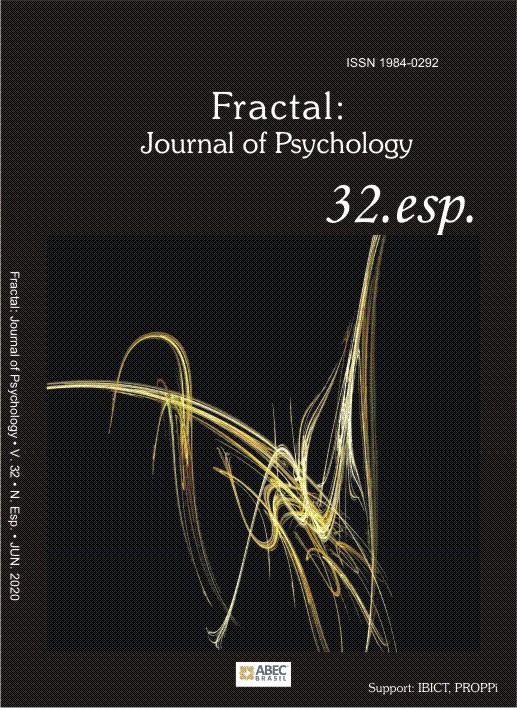How do students perceive teacher’s authority
DOI:
https://doi.org/10.22409/1984-0292/v32_i-esp/38884Keywords:
historical-cultural approach, divergent behavior, teacher authorityAbstract
In contemporary psychology and pedagogy, there is no doubt that the efficiency of instruction is in some way related to the authority of the teacher.This paper focuses on the problem of students’ perception of teacher authority. It is assumed that in order for students to recognize the teacher as an authority, they must develop a certain psychological maturity. Children and adolescents with divergent behavior do not have this maturity. Therefore, in Russian psychology, they were called difficult-to-educate children, since the traditional pedagogical influence directed at them did not produce the desired result. It is considered that, in adolescents, the problems related to authority have two origins: the difficulties in the development of convivial relationship and the difficulties in the activities of playing and role playing. The way to solve these psychological problems can be found in the correction of these two spheres.
Downloads
References
ANDRIADI, Irina Petrovna. Osnovi pedagoguitcheskogo masterstva: Utchebnik. [Bases da maestria pedagógica: Livro de estudo]. Mosckva: [s.n.], 2016.
ARTIOMOVA, Viktoria. Psirhologuitcheskie osobennosti utchaschirhsia, sistematitcheski naruchaiuschirh utchebnuiu distsiplinu [As peculiaridades psicológicas dos estudantes que sistematicamente transgridem a disciplina escolar]. Moskva: RGGU, Institut L. S. Vigotskogo, 2016.
ISSAIEV, Ilia Fiodorovitch. Professionalno-pedagoguitcheskaia kultura prepodavatielia [A cultura profissional e pedagógica do professor]. Moskva: Izdatelski tsentr “Academia”, 2002.
KARANDACHEV, Viktor Nikolaievitch. Metodika Chvartsa dlia izutchenia tsennostei litchnosti: kontseptsia i metoditcheskoie rukovodstvo [O método de Chvarts para o estudo da personalidade: concepção e orientação metodológica]. Sankt-Peterburg: Retch, 2004.
KONDRATIEV, Mirrail Iurievitch. Vzaimosviaz avtoriteta litchnosti i avtoriteta roli utchitelia [Interrelação entre a autoridade da personalidade e a autoridade do professor]. Voprosi Psirhologuii, n. 2, p. 99, 1987.
KRAVTSOV, Guennadi; KRAVTSOVA, Elena. Prirhologuia igri: kulturno-istoritcheski podrhod [Psicologia da brincadeira e do jogo: a abordagem histórico-cultural]. Moskva: Lev, 2017.
KRAVTSOV, Oleg. Sobre o comportamento divergente no contexto da abordagem histórico-cultural. Revista Teoria e Prática da Educação, Maringá, v. 22, n. 1, p. 64-72, 2019. https://doi.org/10.4025/tpe.v22i1.47431
KRAVTSOVA, Elena. Psirhologuitcheskie problemi gotovnosti detei k obutcheniu v chkole [Problemas psicológicos da prontidão das crianças para a instrução na escola]. Moskva: Pedagoguika, 1991.
LEITES, Natan Semionovitch. Vozrastnaia odarionnost i individualnie razlitchia [O talento etário e as diferenças individuais]. Moskva e Voronej: Izadtelstvo Institut praktitcheskoi psirhologuii e NPO MODEK, 1997.
MIRONOVA, Elena. (Org.). Metodika izutchenia frustratsionnirh reaktsi S. Rozentsvega [Metodologia de estudo das reações de frustração de S. Rozentsveg]. Minsk: Jenski institut ENVILA, 2006.
PERELIGUIN, Vladimir Ivanovitch. Otnochenie k “sebie” i k “druguim” u podrostkov (na primere issledovania podrostkov iz sotsialno-reabilitatsionnogo priiuta) [A relação “consigo” e “com os outros” em adolescentes (no exemplo do estudo de adolescentes do abrigo sócio-educativo]. Dissertação (Mestrado) - Instituto de Psicologia de L. S. Vigotski, Moskva: RGGU, 2011.
VIGOTSKI, Lev Semionovitch. Razvitie vischirh psirritcheskirh funktsi [Desenvolvimento das funções psíquicas superiores]. Moskva: Academia Pedagoguitcheskirh Nauk, 1960.
ZARRAROVA, Irina; STRIUKOVA, Galina. Semantitcheski differentsial kak metod diagnostiquei vospriatia utchaschimisia pedagoga [O diferencial semântico como método de diagnóstico da percepção do pedagogo pelos estudantes]. Psirhologuitcheskaia nauka i obrazovanie, n. 3-4, p. 30-35,1999.
Downloads
Published
How to Cite
Issue
Section
License
Authors publishing in this journal agree to the following terms:
- Authors retain copyright and grant the journal the right of first publication, with the work simultaneously licensed under the Creative Commons Attribution License allowing sharing of the work with acknowledgement of authorship of the work and initial publication in this journal.
- Authors are permitted to enter into additional contracts separately for non-exclusive distribution of the version of the work published in this journal (e.g., publishing in an institutional repository or as a book chapter), with acknowledgment of authorship and initial publication in this journal.

This work is licensed under a Creative Commons Attribution 4.0 International License.
To the extent possible under the law, Fractal: Journal of Psychology has waived all copyright and related rights to the Reference Lists in research articles. This work is published in: Brazil.
To the extent possible under law,Fractal: Journal of Psychology has waived all copyright and related or neighboring rights to Reference lists in research articles. This work is published from: Brazil.







